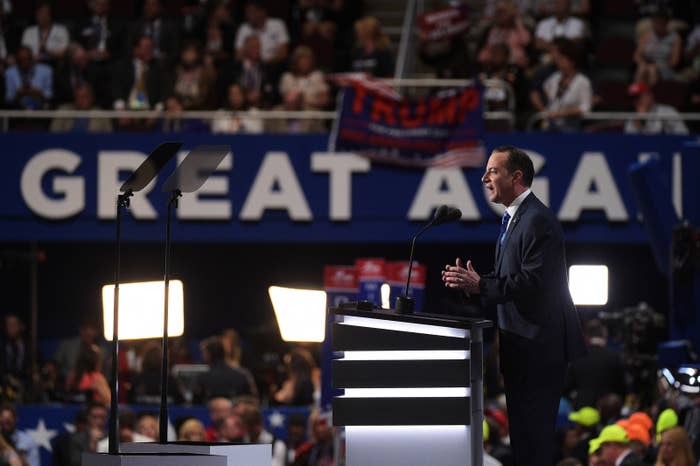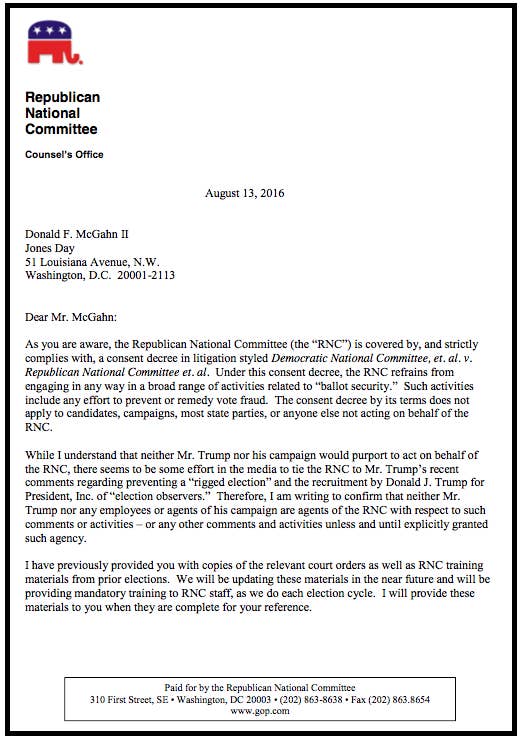
WASHINGTON — At the end of 2017, the Republican National Committee is slated to be freed from decades-old federal court oversight that limits the party's activities when it comes to "ballot security."
In other words, after nine presidential elections, the national Republican Party is set to have more freedom to engage in poll monitoring activities without an automatic court bar on any voter fraud-related efforts at polling places.
But Democrats are now arguing in federal court that Donald Trump's "rigged election" claims and his efforts to send "watchers" to polling places mean the Republican National Committee can't be trusted with that power. The Republican Party's lawyers responded on Monday by attempting to distance the party from Trump's campaign.
On Friday, a federal judge in New Jersey will hold a hearing on the request by the Democratic National Committee to hold the RNC in contempt and extend the order that restrict's the party's activities — for the next two presidential elections.
In the meantime, U.S. District Court Judge Michael Vazquez also has ordered the RNC to turn over potentially significant information about its Election Day plans regarding any "ballot security" efforts and any coordination to that end with the Trump campaign.
In the RNC's filing earlier Monday, the committee's general counsel submitted a 16-page declaration that, for several pages, explained how the Trump campaign's activities should not be attributed to the RNC.
"On behalf of the RNC, I have made clear to the Trump campaign that the RNC cannot and will not be involved in any way with ballot security activities or Election Day operations," RNC chief counsel John R. Phillippe Jr. wrote.
Throughout the Monday filings, the RNC painted a picture of a wholly independent presidential campaign, with the RNC's lawyers arguing, "The RNC has likewise never authorized the Trump campaign to act on its behalf. Just the opposite. The RNC has repeatedly informed its staff and the Trump campaign that neither Donald Trump nor his campaign speaks or acts for or on behalf of the RNC."
As to Trump's focus on voter fraud claims specifically, Phillippe stated, "In August 2016, when I perceived that Mr. Trump was likely to emphasize vote fraud in his campaign, I started to put an even greater emphasis on training regarding the consent decree than in past cycles."
The strong filings were a marked contrast from the RNC's public response in recent weeks to Trump's claims. In mid-October, Politico wrote, "Party chairman Reince Priebus has not refuted the notion that the election is rigged; the RNC declined requests for comment."
Later, when Priebus did comment, he backed up Trump's claims, saying on CBS News' Face the Nation, "I think he’s trying to also tell his folks to watch out for this fraud that might occur."
Nonetheless, the RNC is arguing in court that it has nothing to do with those efforts.
In a filing late Monday night (first noted by law professor Rick Hasen), however, the DNC's lawyers pointed to what they allege are specific instances in Nevada where they say the RNC is engaged in the very type of "ballot security initiatives" barred by the consent decree. The examples included one statement from a former federal prosecutor who submitted a text message, which she says she received from a woman she had met at a Las Vegas early voting site. In the text, the woman says she is there on behalf of the RNC.
The underlying case — Democratic National Committee v. Republican National Committee — originated out of allegations of election-related wrongdoing by Republicans in New Jersey in 1981. The lawsuit led to an agreement, called a consent decree, that the RNC and New Jersey Republican State Committee would not engage in efforts to "deter qualified voters from voting" through "ballot security activities" focused on minority communities. The decree has been amended and extended multiple times since, most recently in 2009.
Fast-forward to 2016, and Democratic lawyers argue that the RNC has violated the consent decree, which is due to expire on Dec. 1, 2017. The penalty for such a violation is dramatic — an eight-year extension of the agreement.
Trump's focus on a "rigged election" and at encouraging supporters to "watch" voting in "certain areas" led the DNC's lawyers to file a request that the RNC be held in contempt for violating the consent decree. Such a finding, however, would require evidence that the Republican Party is supporting those efforts.
In the DNC's Oct. 26 filing, lawyers claim "there is now ample evidence that Trump has enjoyed the direct and tacit support of the RNC in its 'ballot security' endeavors" — pointing to comments from Trump's running mate, Mike Pence, and campaign manager, Kellyanne Conway, that "ballot integrity" and "monitor[ing]" efforts were being coordinated with the RNC.

In the Monday filing, however, the RNC's lawyers struck back — repeatedly distancing themselves from Trump, with the RNC's chief counsel noting, "The Republican Party's presidential nominee is not a voting member or officer of the RNC. ... In the case of Donald J. Trump, he is not — and never has been — a member of the RNC."
Phillippe references several memos that he has sent regarding his efforts to ensure that the RNC adheres to the consent decree in the upcoming election.
An attempt to avoid the consent decree being extended has led the RNC, as Phillippe wrote in one of those memos, "Because of uncertainty about the Consent Decree’s exact boundaries and the severe consequences of a violation, there are some activities we describe as 'prohibited' that we strongly believe are actually permitted, but which we avoid out of an abundance of caution."
In addition, Phillippe noted an Aug. 13 memorandum that he sent to Trump's campaign lawyer, Donald McGahn of Jones Day, about the campaign's "recruitment" of "election observers" in some parts of the country.
"I am writing to confirm that neither Mr. Trump nor any employees or agents of his campaign are agents of the RNC with respect to such comments or activities," Phillippe wrote.
The original judge who oversaw the case for decades, Judge Dickinson R. Debevoise, died in 2015. As of Oct. 27, Chief Judge Jerome Simandle reassigned the case to Judge Vazquez, who held a telephone conference that afternoon with the parties regarding the DNC's request. Vazquez was nominated to the bench in early 2015 by President Obama and confirmed by the Senate in January.
In addition to setting the 5 p.m. Wednesday deadline for the RNC to turn over relevant information regarding alleged ballot security or voter fraud efforts, the DNC's reply to the RNC's Monday filing is due 5 p.m. Thursday.
Oral arguments on the DNC's motion are set for 10 a.m. Friday.
